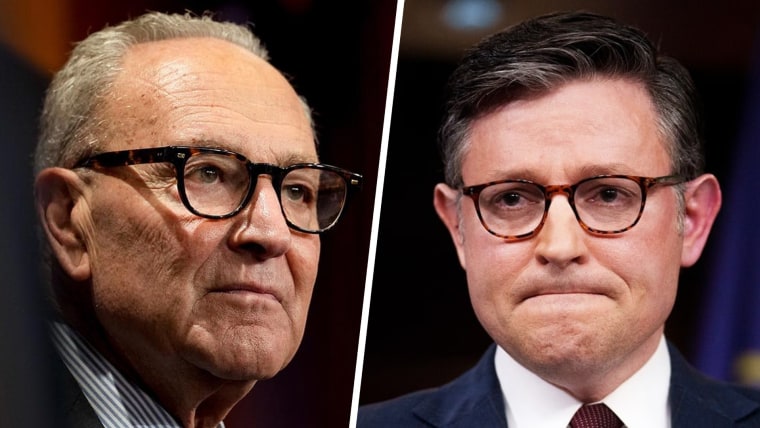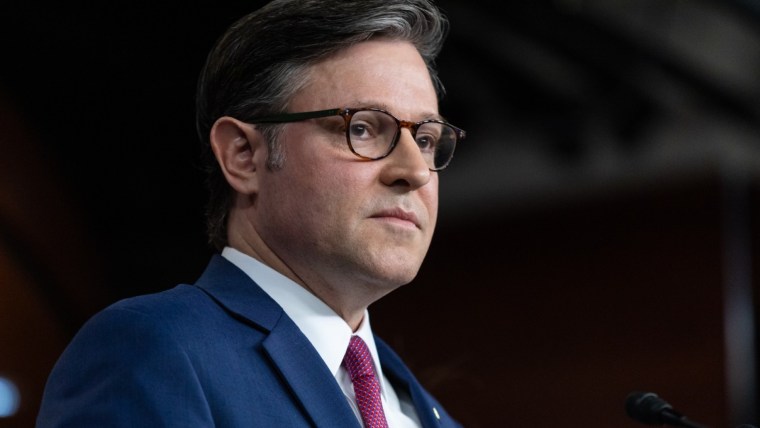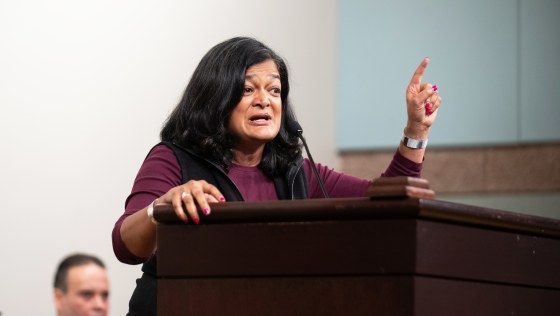As the government shutdown nears the three-week mark, members of Congress say they’re hearing from their constituents — and the calls are only stiffening their resolve.
“Almost to a T, I hear from people that they want us to keep fighting for them, that they want us to stand up and they don’t want us to cave,” Rep. Pramila Jayapal, D-Wash., said.
“They’re all to a person so far: Stay the course,” Rep. Glenn Ivey, D-Md., said.
It’s a similar story on the GOP side.
“It won’t surprise you, being from a red state, that most of the calls are encouraging Republicans to stand their ground and keep up the fight,” Sen. Todd Young, R-Ind., said.
Sen. Joni Ernst, R-Iowa, said constituents “know” that Republicans are “doing the right thing.”
“The Democrats are the ones that are putting politics over people,” Ernst continued.

In interviews with MSNBC, lawmakers from both parties say they're hearing from constituents, and the message is to stay the course. Rather than pressuring lawmakers to cave to the other side and reopen government, lawmakers said most voters have been telling political leaders they should lean in — not just reducing the pressure to end the standoff but actually ratcheting up the heat to continue holding out.
‘They want us to fight’
For Democrats, the shutdown continues to be about health care. Several Democratic lawmakers said voters are fired up about the pending expiration of Obamacare subsidies, which could cause insurance premiums for some Americans to more than double next year.
That message was true even for Democrats representing districts with the highest concentration of government workers, who have been facing furloughs since Oct. 1 and, in some cases, firings.
More than 700,000 federal workers are estimated to be furloughed as part of the shutdown. Many others are working without a paycheck, though they are expected to eventually receive backpay.
In Democratic Rep. Sarah Elfreth’s Maryland district, more than 40,000 people work for the federal government. But she told MSNBC that the firings are “not a new phenomenon in terms of culture of the president towards civil servants.”
“And people understand that, and they want us to fight,” Elfreth said.
As the shutdown continues, Elfreth has begun posting videos on social media in which she calls back constituents who have expressed concerns about the future of health care policy — from the status of health savings accounts to the threat of rising premiums.
Rep. Marcy Kaptur, D-Ohio, shared with MSNBC a conversation she had with a small businessman in her district. “He goes, ‘Marcy, what’s going to happen to my premiums?’ I said, ‘Sir, we don’t know yet … This is part of the problem.’ He says, ‘How am I supposed to plan for my business?’”
That consideration has emerged as a key one for Democrats. As Republicans argue that Congress has until the end of the year to address the expiring subsidies, maintaining that they’ll only negotiate on those tax credits after Democrats reopen government, Democrats are pointing out that families are about to make health care decisions in a matter of weeks — not months.
I know there are a lot of Americans who are anxious about the shutdown, but I just don’t know that, until the last couple of days, there’s been a whole lot of engagement.”
Sen. Todd Young, R-Ind.
Open enrollment begins on Nov. 1, and many Americans could be forced to sign up for Obamacare without knowing whether lawmakers will eventually lower premiums.
It’s an issue that seems to be resonating with voters, even in districts where the shutdown is a major issue.
Rep. Jamie Raskin, D-Md., told MSNBC that “the vast majority of people I’m hearing from and seeing insist that we hang tough to resolve the health care crisis and the government shutdown at the same time.”
“We don’t have the luxury of choosing here,” Raskin said.
And that’s coming from a lawmaker whose district is estimated to be home to more than 50,000 federal workers — and who has heard from a number of constituents who’ve been affected by the shutdown.
Raskin’s office shared some of the messages the congressman has been receiving, such as a worker at the Department of Health and Human Services who warned of uncertainty and confusion at the agency.
“As of today, we have no confirmation of our firings because our entire office lost access to our HHS accounts," the HHS employee said in a message.
Another federal worker, who said they were fired from the Department of Education, told Raskin’s team, “The loss of income will be devastating to me and my family. I dedicated my career to public service so this is … difficult.”
Still, lawmakers told MSNBC that they hadn’t been hearing from as many constituents concerned about the shutdown as in the past.
‘Fewer calls’
Young said his office was “struck by how many fewer calls we were getting than they expected.”
“I know there are a lot of Americans who are anxious about the shutdown, but I just don’t know that, until the last couple of days, there’s been a whole lot of engagement,” Young said last week.
Sen. Shelley Moore Capito, R-W.Va., backed up Young’s assessment. “It’s more this week than last,” she said of the calls, “but it’s still not at a fevered pitch.”

Capito said the lower volume of outreach has “probably” lessened the impetus on lawmakers to find a resolution.
Democrats also hinted at receiving fewer calls than in previous shutdowns.
One Democratic office in the House told MSNBC that the number of calls they’d gotten was not all that different from a typical day when the government is open.
And when MSNBC asked Sen. Chris Murphy, D-Conn., if his office had been receiving fewer calls than during past shutdowns, Murphy said his “sense is the media is not covering this shutdown in the way they have covered previous shutdowns.”
“So naturally,” Murphy continued, “people are not going to hear as much.”
He added that, “As every day goes by, I get more people calling about the premium increases.”
That’s the gamble Democratic leaders are making.
Since the start of the shutdown, Senate Minority Leader Chuck Schumer, D-N.Y., has argued that once Americans see their higher insurance premiums, Republicans will feel pressure from voters to come to the table and negotiate a deal.
“The Republican congressmen and senators are feeling the heat from their constituencies because this crisis is so bad,” Schumer told reporters last week.
But are Republican lawmakers hearing that sort of message from voters?
“Some, but not overwhelming,” Sen. John Boozman, R-Ark., told MSNBC. “The truth in that is that, right now, there doesn’t seem to be a lot of sense of urgency.”
